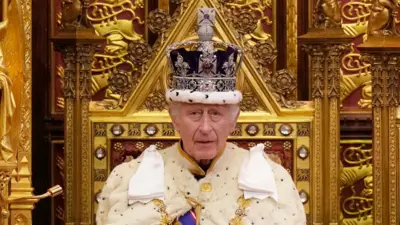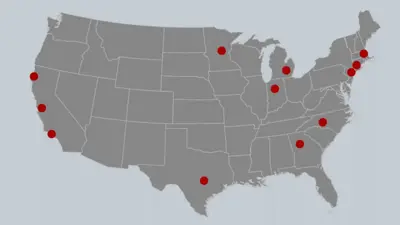We've updated our Privacy and Cookies Policy
We've made some important changes to our Privacy and Cookies Policy and we want you to know what this means for you and your data.
NI Protocol 'hits economy compared with no Brexit'
- By John Campbell
- BBC News NI Economics & Business Editor
Image source, Charles McQuillan
The protocol could leave Northern Ireland's economy 2.6% smaller compared with a scenario in which the UK stayed in the EU, new analysis suggests.
The economic hit could be halved with a major switch from GB to EU suppliers.
The analysis was carried out by the Fraser of Allander Institute (FAI) at Strathclyde University.
Earlier this year the Office of Budget Responsibility (OBR) said Brexit would reduce the UK's potential GDP by about 4% in the long term.
However the OBR estimates may not be fully comparable with the FAI work.
Soft Brexit 'least damaging' outcome
A previous FAI study suggested the least damaging Brexit outcome for Northern Ireland would have been a soft Brexit for all of the UK.
That 2019 study suggested a "Norway-style" arrangement for the whole of the UK would have would cost Northern Ireland's economy an estimated 1.1% of GDP compared with no Brexit.
The protocol is the Brexit deal which prevents a hard Irish border by keeping Northern Ireland inside the EU's single market for goods.
That means that goods can flow freely between the Republic of Ireland and Northern Ireland, removing the threat of a "hard border".
However, goods arriving into Northern Ireland from the rest of the UK are now subject to checks and controls - amounting to what is being referred to as an "Irish Sea border".
GB goods checks 'biggest negative'
The new study uses economic modelling to focus on the impact of trade in goods and services.
The model does not consider the impacts of migration, foreign direct investment or economic spill-over effects from GB.
Image source, Getty Images
It does include the impact of new barriers to services trade between Northern Ireland and the EU, something not covered by the protocol.
It finds that the biggest negative impact on the Northern Ireland economy comes from non-tariff barriers, in other words the new checks and controls on goods coming from GB.
'No evidence' protocol gives best of both worlds
Mitigating those impacts depends on the ability of Northern Ireland firms to source more goods and components from the EU.
However it finds that "under no reasonable circumstances" could that provide full mitigation and therefore "there appears to be no evidence that the protocol allows Northern Ireland to enjoy the best of both worlds".
One of the reasons for this is that non-tariff barriers on trade of services between Northern Ireland and the EU are still present and cause a reduction in exports compared with the pre-Brexit period.
The analysis also acknowledges there is uncertainty about the magnitude of the non-tariff barriers on GB to Northern Ireland goods trade.
Not all controls envisioned by the protocol are being carried out and EU-UK negotiations are attempting to find ways to permanently reduce checks.
The analysis suggests that in an optimistic scenario where checks can be reduced the economic hit would fall to 1.5%.
However in a pessimistic scenario where there is major divergence between the EU and UK, and therefore between Northern Ireland and GB, the hit could be 3.5%.
Top Stories
Features & Analysis
Most read
Content is not available








